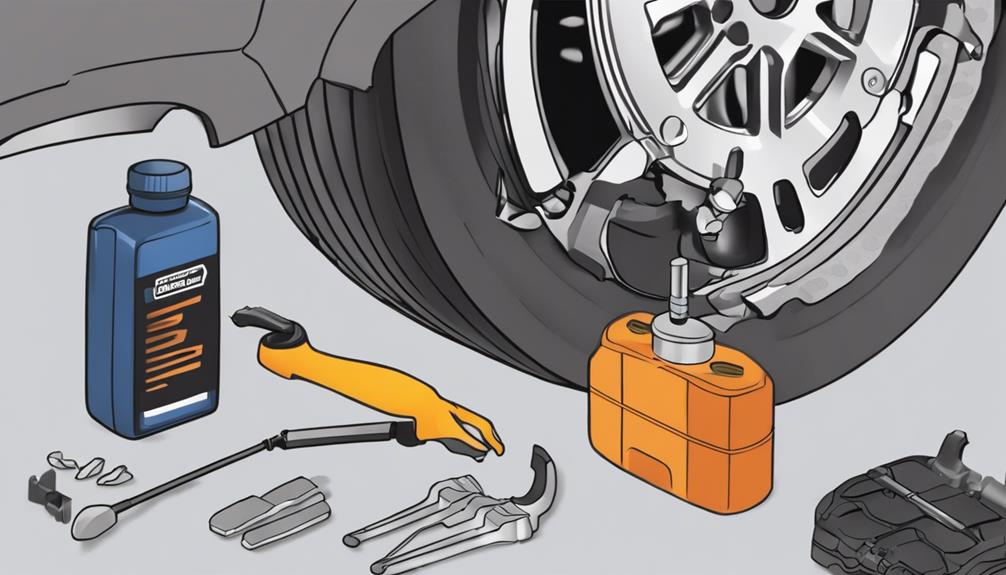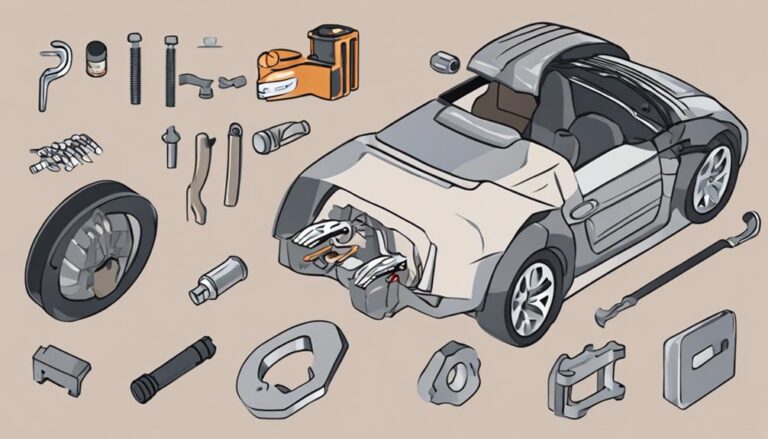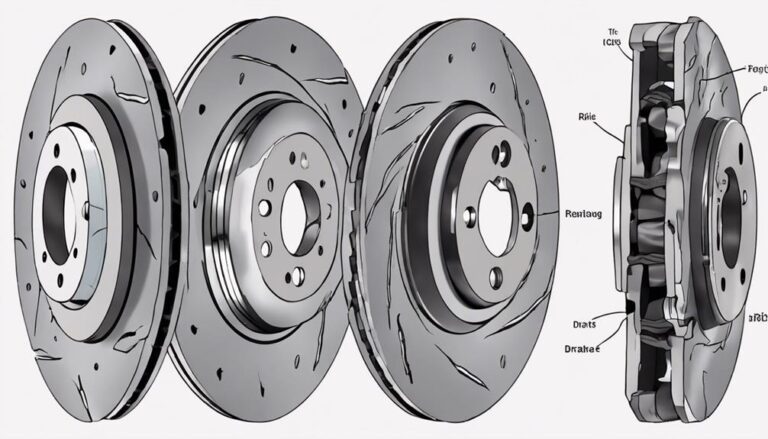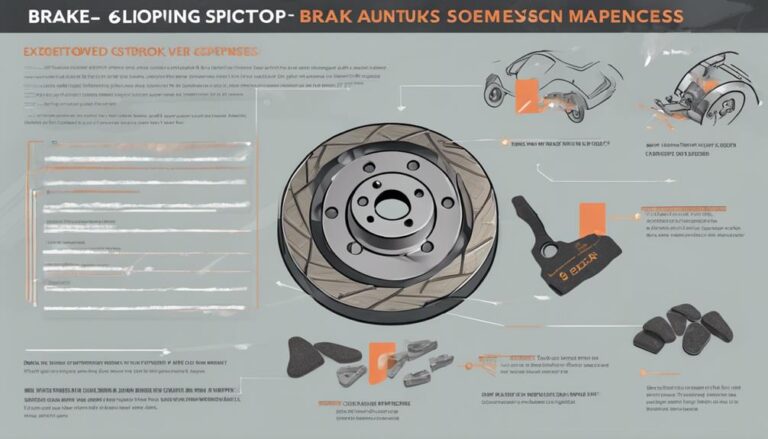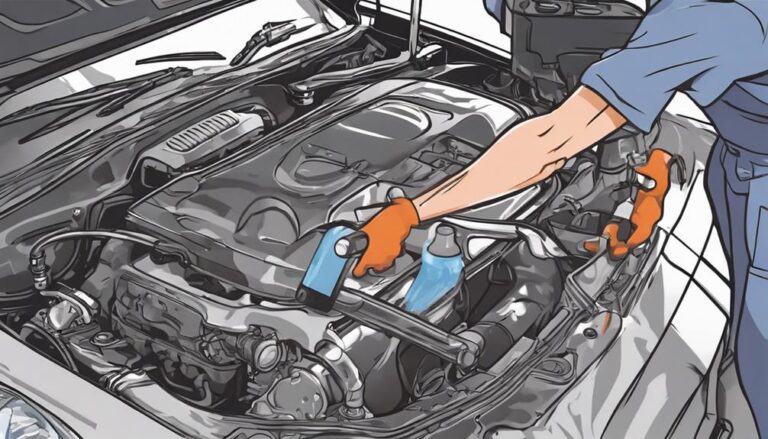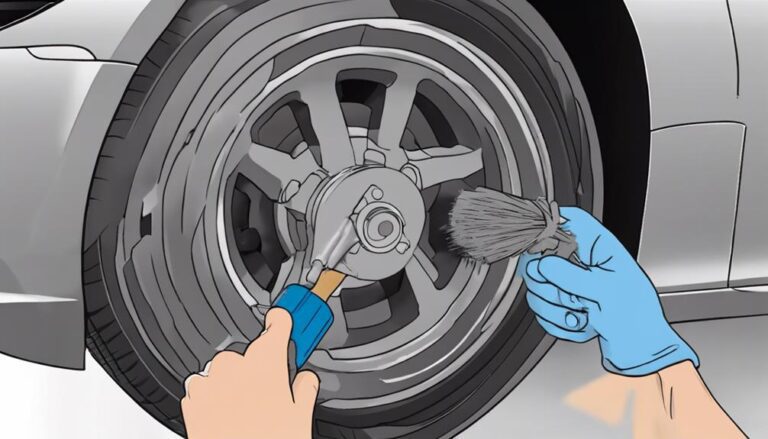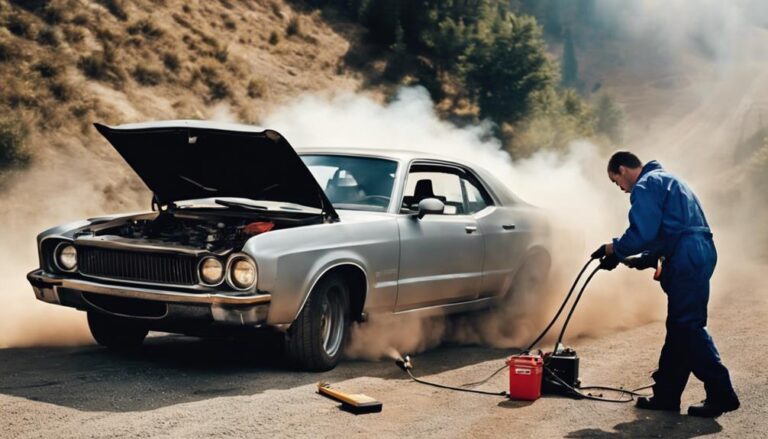Top 10 Brake System Maintenance Tips for Your Car
When it comes to your car's brake system, staying ahead of the curve is like taking the wheel of safety and control in your hands.
But, have you ever wondered what the top 10 brake system maintenance tips are for your vehicle?
From understanding the importance of regular brake inspections to knowing when to replace worn brake pads, these essential tips can make all the difference in your driving experience.
So, are you ready to ensure your brakes are in top-notch condition?
Key Takeaways
- Regular brake inspections every 12,000 miles enhance safety and longevity.
- Proper brake fluid management ensures effective braking performance.
- Timely replacement of worn brake components prevents costly damage.
- Professional assistance and testing ensure optimal brake system functionality.
Regular Brake Inspections
When conducting regular brake inspections every 12,000 miles or as recommended by the manufacturer, qualified professionals thoroughly examine brake components such as pads, rotors, and calipers to detect signs of wear or damage early on.
Brake pad longevity is a critical aspect of these inspections. The thickness of the brake pads is carefully measured, ensuring they're within safe limits to provide optimal stopping power. Additionally, technicians pay close attention to rotor wear patterns. By inspecting the rotors for any irregularities such as grooving, scoring, or warping, potential issues can be identified and resolved promptly.
Understanding rotor wear patterns helps in determining if the rotors need resurfacing or replacement to maintain proper braking performance. By addressing these factors proactively, you can extend the lifespan of your brake components, minimize the risk of brake failure, and ultimately ensure a safer driving experience.
Regular brake inspections play a crucial role in maintaining your vehicle's braking system at its peak efficiency.
Monitor Brake Fluid Level
To maintain your brake system in top condition, regularly check the brake fluid levels using the markings on the reservoir.
Ensure you use the correct type of brake fluid as specified in your owner's manual to guarantee optimal performance.
Keep the brake fluid at the correct level by topping up as necessary for safe and effective braking operation.
Check Fluid Regularly
Regularly monitoring your brake fluid level is crucial to maintaining optimal brake system performance. Check for any signs of contamination or discoloration in the brake fluid, as these can indicate the need for a change. Keeping the correct brake fluid level is essential for effective braking and overall safety. Low levels might lead to decreased braking efficiency and potential hazards. By regularly inspecting and topping up the brake fluid, you can prevent malfunctions and ensure reliable braking. Below is a table summarizing key points for checking your brake fluid:
| Brake Fluid Maintenance Tips | Description |
|---|---|
| Brake Fluid Contamination Prevention | Regularly check for any signs of contamination in the brake fluid. |
| Brake Fluid Coloration Detection | Look out for any discoloration in the brake fluid, indicating the need for a change. |
Use Proper Type
Using the correct type of brake fluid specified in your car's owner's manual is essential for maintaining optimal brake system performance. Brake fluid compatibility is crucial to prevent damage to the braking system components. Different types of brake fluid have varying specifications, including viscosity and boiling points, which can impact braking performance.
Failure to use the recommended fluid type may result in decreased braking efficiency and safety risks. Always follow safety precautions when handling brake fluid, such as avoiding skin contact and using a clean environment to prevent contamination.
Checking the owner's manual for the specific fluid type required for your vehicle is essential to ensure proper maintenance and longevity of your brake system.
Replace Worn Brake Pads
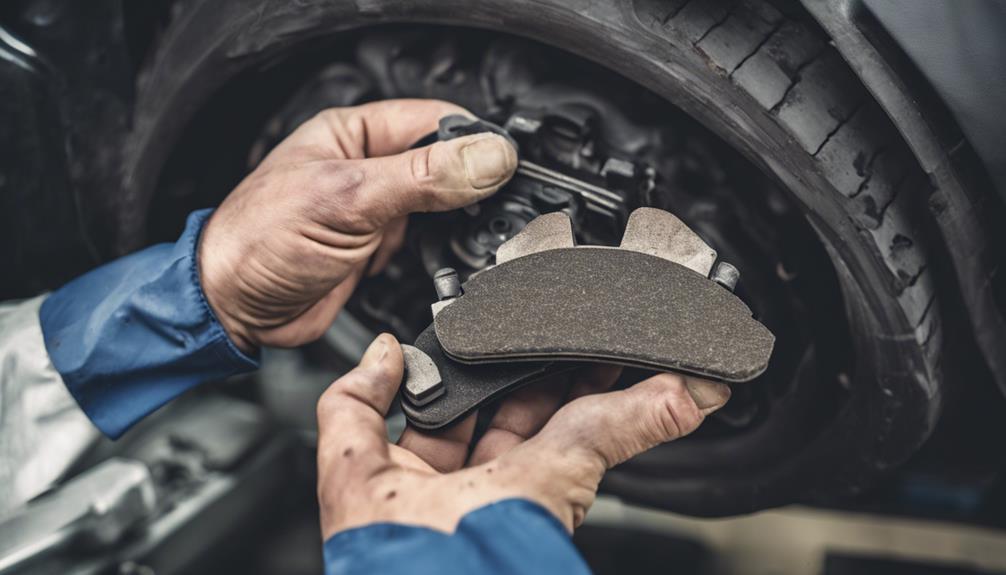
Inspecting and replacing worn brake pads is crucial for maintaining optimal braking performance and safety in your vehicle. Preventive maintenance is key to ensuring your brake pads are in good condition. Brake pads have a lifespan that varies based on driving habits, road conditions, and the type of brake pads used. Regularly check your brake pads for thickness and signs of wear to prevent issues like increased stopping distance and reduced braking efficiency. Following the manufacturer's recommendations for brake pad replacement intervals is essential to uphold safety standards. Hearing squealing or grinding noises while braking indicates an urgent need for brake pad replacement. Promptly replacing worn brake pads not only prevents damage to the rotors but also ensures safe driving conditions for you and other road users.
| Signs of Worn Brake Pads | Importance |
|---|---|
| Increased stopping distance | Safety first |
| Reduced braking efficiency | Optimal performance |
| Squealing or grinding noises | Urgent attention |
Check Brake Discs for Wear
To ensure the optimal performance and safety of your vehicle's braking system, carefully examine the brake discs for wear indicators such as grooves, ridges, or uneven patterns. It's crucial to assess the condition of the brake discs regularly to maintain efficient braking.
Here are some key steps to consider:
- Inspecting Grooves: Check for any grooves or deep indentations on the brake disc surface, as these can affect brake pad contact and overall braking performance.
- Measuring Thickness: Utilize a caliper to measure the thickness of the brake discs accurately. Ensure they're within the manufacturer's specified limits for safe operation.
- Identifying Signs of Damage: Look for any signs of warping, discoloration, or uneven thickness across the brake disc surface, as these may indicate potential damage or overheating.
- Preventing Damage: Replace brake discs promptly if they're below the minimum thickness requirement or exhibit any signs of wear and tear to prevent further damage and ensure reliable braking performance.
- Ensuring Smooth Surface: Inspect the brake disc surface for smoothness to guarantee proper brake pad contact and optimal braking efficiency.
Maintain Brake Lines Integrity
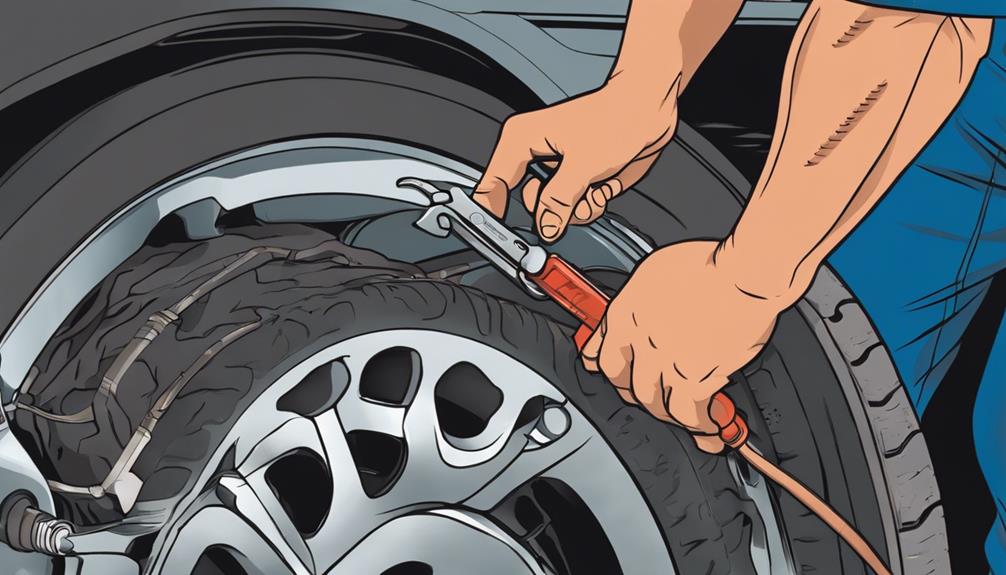
Maintaining the integrity of your brake lines is crucial for ensuring optimal safety and performance of your vehicle's braking system. Regularly inspect your brake lines for leaks, cracks, or any signs of damage to prevent potential issues.
Check the connections and fittings to ensure they're tight and free of leaks. It's essential to look out for rust or corrosion on the brake lines as these can weaken the lines and compromise safety.
To prevent wear, ensure that the brake lines are properly secured and positioned away from any moving parts that could cause damage. Implement corrosion prevention measures to safeguard the integrity of the brake lines over time.
Leak detection is also vital; any leaks should be addressed promptly to maintain the effectiveness of your brake system. By proactively maintaining your brake lines, you can ensure the safety and reliability of your vehicle's braking system.
Address Brake System Leaks Promptly
To ensure the safety and reliability of your vehicle's braking system, promptly addressing any brake system leaks is crucial in preventing brake fluid loss that can lead to brake failure. When dealing with brake system leaks, follow these essential tips:
- Inspect Regularly: Check for signs of brake fluid leaks such as puddles under the car or a low brake fluid level in the reservoir.
- Act Promptly: Leaking brake fluid can compromise braking performance and pose a safety risk. Seek professional assistance to diagnose and repair leaks promptly.
- Preventive Measures: Addressing leaks promptly can prevent brake fluid contamination, which can damage other components of the brake system.
- Safety First: Brake system leaks can lead to brake system corrosion; therefore, it's crucial to troubleshoot and address any leaks to maintain optimal brake performance.
- Professional Help: When in doubt, seek the expertise of professionals to ensure the integrity of your brake system and the safety of your vehicle.
Test Brake Operation Regularly
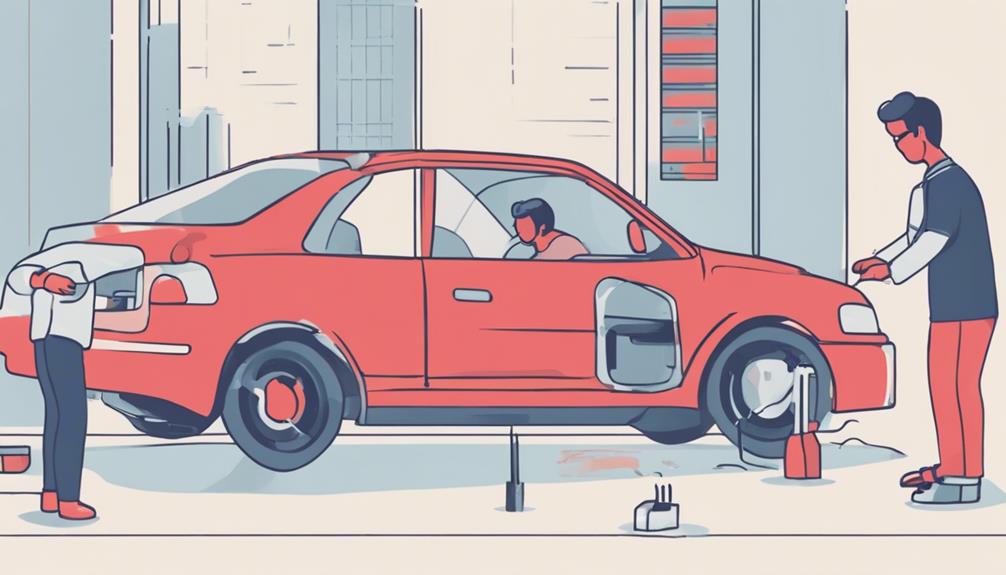
To ensure your brake system is functioning properly, start by checking the brake pedal for responsiveness and any unusual noises like squeaking or grinding. Listening for these sounds can help you detect potential issues early on.
Additionally, pay attention to vibrations or pulsations in the brake pedal or steering wheel, as these can indicate underlying brake system problems.
Check Brake Pedal
Regularly test the brake pedal in your vehicle by pressing it down firmly to ensure it feels solid and doesn't sink to the floor, indicating proper brake operation. When checking your brake pedal, pay attention to the following:
- Pedal Feel: Ensure the brake pedal offers resistance and doesn't feel spongy or loose.
- Braking Consistency: Check for any variations in braking power or feel while applying the brakes.
- Return Smoothness: Verify that the brake pedal returns to its initial position smoothly after releasing pressure.
- Responsiveness: Assess how quickly the brakes engage after pressing the pedal.
- Changes in Pedal Feel: Note any sudden changes in how the brake pedal feels during braking, as this could signal underlying issues.
Listen for Noises
Have you ever noticed any unusual noises when applying your brakes? It's crucial to listen for any squealing, grinding, or rubbing sounds as they can be indicative of worn brake pads or other underlying issues.
Additionally, pay attention to any clicking, vibrating sensations, or strange noises like hissing or metal scraping sounds, as these may signal brake system problems that require immediate attention.
Regularly testing the operation of your brakes through sound evaluation can help in the early detection of potential issues such as warped brake rotors or loose components.
Keep Calipers Clean and Lubricated
Ensure optimal brake performance by keeping your car's calipers clean and well-lubricated. Clean calipers prevent brake drag and ensure even pad wear. Lubricated caliper slides reduce friction and improve brake responsiveness. Dirty or stuck calipers can cause uneven braking and premature wear on pads. Regular cleaning and lubrication of calipers extend brake system lifespan. Properly maintained calipers contribute to overall brake system efficiency and performance.
- Prevent Brake Drag: Regular cleaning prevents debris buildup that can lead to brake drag, ensuring smooth operation.
- Ensure Even Pad Wear: Clean calipers help distribute braking force evenly across the brake pads, extending their lifespan.
- Use High-Temperature Grease: Lubricate caliper slides with high-temperature grease to withstand braking heat and reduce friction.
- Inspect for Corrosion: Regularly check for rust or corrosion on calipers, addressing it promptly to prevent damage and ensure longevity.
- Check Rubber Seals: Ensure rubber seals are intact and properly lubricated to maintain caliper performance and prevent leaks.
Consider Upgrading Brake Components
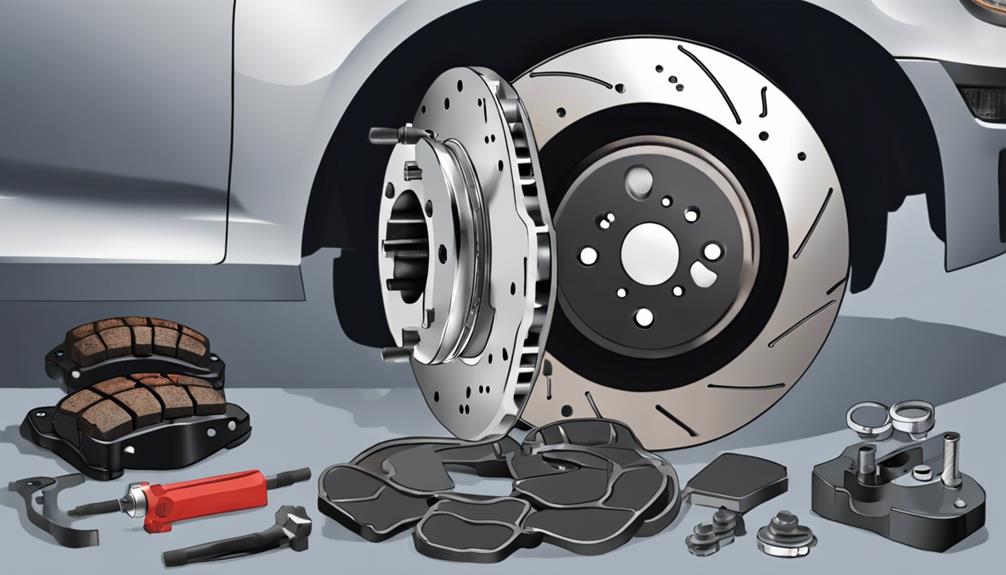
When considering upgrading brake components for your car, you can enhance braking performance significantly. Upgraded materials like slotted disc brakes and ceramic brake pads offer better heat dissipation, reduced brake fade, and improved operation.
High-performance components such as stainless steel brake lines and larger brake kits can also provide increased safety features and improved braking power.
Enhanced Braking Performance
Consider enhancing your vehicle's braking performance by upgrading brake components such as slotted disc brakes and ceramic brake pads for improved heat resistance and reduced noise levels.
Upgrading to slotted disc brakes can provide better heat resistance and improved braking performance. Consider switching to ceramic brake pads for reduced noise and brake dust accumulation.
Upgraded brake components can enhance the longevity and overall performance of your braking system. Opting for high-performance brake parts can improve your car's braking efficiency and responsiveness.
Upgrading brake components is a simple yet effective way to boost your vehicle's braking performance and safety.
Improved Safety Features
To enhance the safety features of your vehicle, upgrading brake components such as slotted disc brakes and ceramic brake pads is recommended for improved performance and reduced maintenance. Slotted disc brakes offer better heat dissipation, reducing brake fade during intense braking. Ceramic brake pads not only minimize brake dust and noise but also deliver superior braking performance. Additionally, investing in high-performance brake components like stainless steel brake lines can enhance brake pedal feel and responsiveness. Upgrading to drilled brake rotors enhances cooling efficiency, reducing the risk of brake fade during extended braking periods. Consider enhancing your brake system technology with upgraded brake calipers featuring larger pistons to increase braking force and overall performance.
| Brake Component | Advantages |
|---|---|
| Slotted Disc Brakes | Improved heat dissipation, reduced brake fade during heavy braking |
| Ceramic Brake Pads | Reduced brake dust, minimal noise, better braking performance |
| Stainless Steel Lines | Enhanced brake pedal feel and responsiveness |
| Drilled Brake Rotors | Improved cooling efficiency, reduced risk of brake fade during prolonged braking |
Upgraded Brake Materials
Enhance your car's braking system by considering the benefits of upgrading to high-performance brake materials, such as ceramic pads and slotted disc brakes, for improved safety and performance. Upgrading brake components can lead to improved efficiency and enhanced durability, providing you with a better driving experience.
Here are some key reasons to consider upgrading your brake materials:
- Reduced noise and brake dust for a cleaner driving environment
- Improved heat dissipation to reduce the risk of brake fade
- Better stopping power for enhanced safety and responsiveness
- Increased durability, longevity, and resistance to wear
- Enhanced braking performance, leading to reduced maintenance frequency and an overall better driving experience.
Follow Manufacturer's Recommended Maintenance
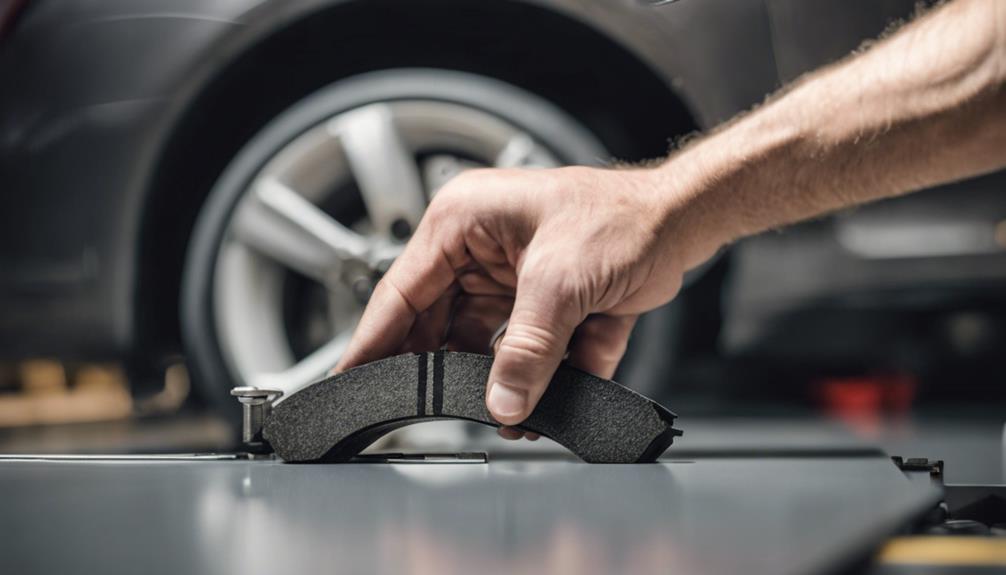
For optimal performance and longevity of your vehicle's brake system, adhere strictly to the manufacturer's recommended maintenance intervals. Manufacturers provide specific guidelines for brake system maintenance intervals to ensure your brakes operate at their best. Ignoring these recommendations can lead to premature wear and potential brake system issues. Regular maintenance based on manufacturer instructions is key to prolonging the life of your brake system and preventing costly repairs down the line. Whether you are considering DIY maintenance or opting for professional servicing, following the manufacturer's guidelines is crucial. Below is a table summarizing the importance of adhering to manufacturer recommended maintenance:
| Importance of Manufacturer Guidelines | Benefits |
|---|---|
| Ensures optimal performance | Longer brake system life |
| Prevents premature wear | Avoids costly repairs |
| Follows safety standards | Peace of mind |
Frequently Asked Questions
How Do You Maintain a Braking System?
To maintain a braking system effectively, regularly check brake pads for wear and change brake fluid every 25,000 miles. Timely replacement of worn brake components is crucial to prevent friction-related damage and ensure optimal safety.
How Do I Keep My Brakes in Good Condition?
To keep your brakes in top shape, regularly inspect pads, check fluid levels, monitor discs, bleed the system, and avoid aggressive braking. Following these troubleshooting tips ensures optimal brake system performance and longevity.
What Is Normal Brake Maintenance?
Maintaining your brakes involves regular inspections, fluid changes, and component checks. It's crucial to monitor brake fluid levels and the condition of brake pads to ensure optimal performance and safety while driving.
How Can I Improve My Car Brakes?
To improve your car brakes, consider brake pad upgrades for better performance. Practice emergency braking techniques for safety. Upgrading to slotted disc brakes and using ceramic pads can enhance heat resistance, reduce noise, and brake dust.
Conclusion
In conclusion, maintaining your car's brake system is like performing a delicate dance between safety and performance. By following these top 10 brake system maintenance tips, you can ensure that your brakes are functioning at their best and keep yourself and others safe on the road.
Remember, a well-maintained brake system is the key to smooth and efficient stopping power. Stay proactive and stay safe!

